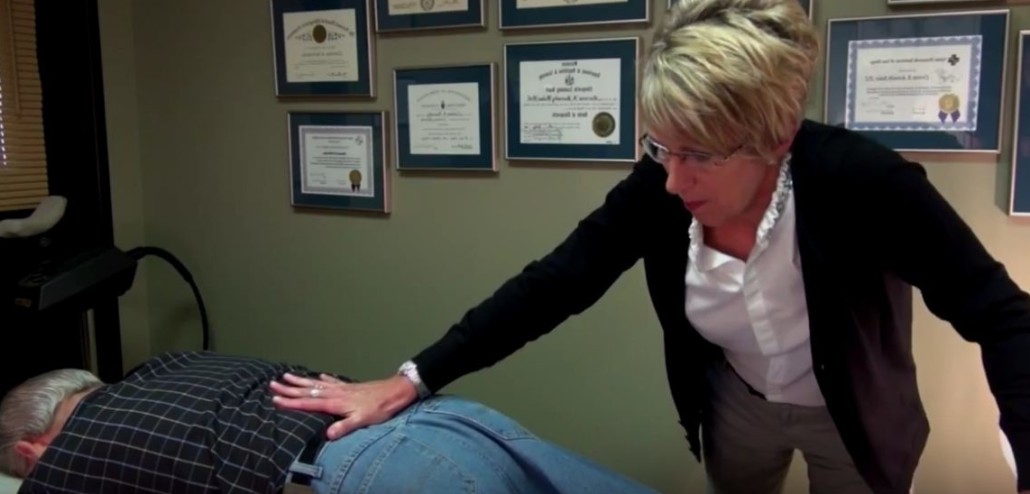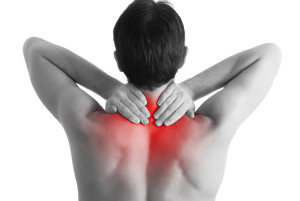You’re in pain.
Back Pain & Chiropractic Care
Falls, car accidents, sports injuries, heavy lifting or repetitive work are common causes of back pain. Often the vertebrae (spinal bones) are involved in this damage. Because the vertebrae protect the nerves that travel through the spinal column, even a small change in their position can significantly affect sensitive nerve tissue. A problem with a disc (fibrous cushion between each vertebra) can also cause pain through the buttock and legs as well as numbness and tingling in the legs. The good news is you have options to treat this pain.
Options:
- Medicate with pain killers and muscle relaxants, which just numbs the body.
- Physical Therapy, which can stress the malfunctioning joints.
- Chiropractic, which will go straight to the source of the problem and correct it. By correcting the source and not just treating the symptoms your body can heal naturally.
Neck Pain & Chiropractic Care
If you have neck pain something is wrong. The health of your neck is very important, and when you feel pain in your neck it is a warning. Your body functions under the control of your central nervous system which starts in your brain and turns into the spinal cord running through the 7 bones in your neck into your spine. From there, the nerves branch out into your body between the bones in your neck and spine to control every system and organ in your body. Your neck is the gateway between your brain and the rest of your body. So, when your neck is out of alignment, it will affect the rest of your body. Some causes of neck pain are birth, accident, sports, work, sleeping wrong, arthritis, etc. Physical, emotional, or chemical stress can affect how often you have neck pain. For many of us the neck and shoulders are the “weakest link in the chain” and so stress shows up here. If neck pain goes untreated chronic muscle spasms set in, causing headaches.
Treatments:
- Perform a spinal manipulation (adjustment) to improve spinal function and to alleviate irritation of the central nervous system.
- Perform 1 or more chiropractic therapies.
- Provide nutritional advice as well as exercise and stretching information.
FREQUENTLY ASKED QUESTIONS
Back Pain FAQs
What is back pain?
The back is a complex structure composed of bones, muscles, nerves and joints that runs from the shoulders to the hips. Back pain, which is very common, is caused by a problem of one of these elements.
It’s a musculoskeletal disorder that can present in a range of ways:
- a slight twinge to severe pain
- a dull, constant ache to a sudden, sharp pain that makes movement difficult
- gradually becomes worse or onset quickly after an event
What are the symptoms of back pain?
Back pain is most common in the lumbar (lower back) region, although it can be experienced anywhere between the shoulders and hips.
Back pain symptoms include:
- muscle ache
- spasms
- tension and stiffness
- soreness
- pain that radiates down your legs
- limited range of motion of your back
What risk factors contribute to back pain?
There are several risk factors that can increase your chances of developing back pain, and can include:
- aging– wear and tear that comes with age, or a degenerative disease, can lead to a reduction in bone strength, a decrease in muscle elasticity and tone, and a loss of fluid and flexibility of your intervertebral discs
- being overweight–carrying extra weight increases pressure on your spine
- smoking–causes tissue damage, and may accompany a less healthy lifestyle
- pregnancy– carrying extra weight when expecting a baby can put strain on your back
- occupation – a job that involves heavy lifting can lead to back pain. Inversely, an inactive job with inadequate back support or poor posture while sitting can also cause pain
- mental illness – such as anxiety, stress or depression, can cause physical side effects
What causes back pain?
Most often back pain develops for no obvious reason and is known as nonspecific back pain.
Other times, a disruption to the normal function of muscles, ligaments, cartilage or an irritated or pinched nerve can create pain. This can be caused by minor strains and sprains, injuries or muscle overuse.
However, on occasion back pain is caused by more serious damage or disease to your spine.
Conditions that are often linked to back pain include:
- a herniated disc– the soft material inside an intervertebral disc can bulge or rupture, pressing on the spine or a nerve when compressed. This is also known as sciatica if the sciatic nerve is compressed
- degenerative disc disease–intervertebral discs lose integrity and their cushioning ability with age
- spondylolisthesis – when a lower vertebra slips out of place directly onto the bone beneath it
- spinal stenosis– narrowing of the space in the spinal column, putting pressure on the spinal cord and nerves
What should I do when my back hurts?
Back pain often resolves itself without seeing a doctor or chiropractor, but there are some remedies that can relieve a back that hurts and speed up recovery. These include:
- keep active– exercise strengthens and increases flexibility of your back and releases natural painkillers, called endorphins
- over-the-counter pain relievers-such as ibuprofen
- heat or ice– may loosen tight muscles, reduce swelling and lessen pain
- rest comfortably– changing your sleeping position or surface may take some of the strain off your back
- relax– relieve muscle tension and recover faster
When should I worry about my back pain?
Most cases of back pain don’t require urgent care, but a doctor should be seen immediately if your pain is the result of trauma, or if your pain is accompanied by any of the following symptoms:
- fever
- unexplained recent weight loss
- chest pain
- a swelling or a deformity in your back
- loss of bladder or bowel control
- inability to pass urine
- constant pain that won’t ease
- worse pain at night
- numbness around your genitals, buttocks or back passage
- tingling or numbness in your legs or arms
Should I see a chiropractor?
Those with unexplained back pain, that has not eased with self remedies, can generally benefit from a visit to the chiropractor. If your chiropractor doesn’t think there is a natural solution, or thinks that you may also benefit from a trip to the doctor, he or she will refer you to a doctor or specialist for additional input, and to find a solution to ease your pain.
Neck Pain FAQs
What is neck pain?
Neck pain is often a symptom of the neck being out of alignment, surrounding muscles being torn or compromised, hyperextension and hyperflexion, herniated cervical discs, osteoarthritis, or a number of other issues. For many of us, the neck is the “weakest link in the chain” and everyday stressors, accidents, and injuries can all affect neck health.
While neck pain is fairly common, it should still be taken seriously. Any type of neck pain is a warning that something is wrong. Luckily, there are plenty of options for treatment of neck pain, including chiropractic care.
What are the symptoms of neck pain?
Symptoms of neck pain can include:
- Pain in any part of the neck, shoulders, or upper back that is made worse by daily living activities like driving, working at a computer, or holding the head in a certain position for an extended period of time.
- Tightness or spasms of neck muscles.
- Reduced mobility of head and neck.
What risk factors contribute to neck pain?
The neck does a lot of work and is nearly constantly in motion, so it is extra vulnerable to conditions that can cause pain.
Risk factors for neck pain include:
- Strained muscles. Your neck muscles can weaken and become strained by overuse. Common issues include working at a computer, heavy use of a smartphone, gritting teeth, and poor posture.
- Joint issues. Like any other part of the body, your joints can wear down over time. Osteoarthritis can contribute to worn cartilage between bones, which can then cause bone spurs, impede motion, and cause pain.
- Auto injuries can cause whiplash, which is a major cause of neck strain and, resultantly, pain.
- Nerve compression. There are a lot of nerves in the neck, and herniated disks or bone spurs can pinch these nerves, causing pain.
- Chronic conditions like rheumatoid arthritis, cancer, or meningitis can contribute to neck pain.
What causes neck pain?
Often, neck pain is caused by one or more issues. Here are just some of the potential causes of neck pain:
- Accident or injury
- Whiplash
- Osteoarthritis
- Prolonged stress from sitting at a desk
- Other physical, emotional, or chemical stress
- Poor posture
- Spinal misalignment
- Degenerative conditions in the spine
- Herniated discs
- Heavy or prolonged use of smartphones (also known as “text neck”)
When should I worry about neck pain?
It is important that you don’t ignore neck pain, especially if it continues over a period of time, is severe, or happens after an accident or injury. Chiropractic or other medical care can help ensure the pain does not persist or get worse, and can ensure that this crucial gateway between your head and your body stays strong and healthy over the long term.
How can I avoid future neck pain?
Generally, neck pain is caused by a combination of factors which usually include poor posture and age-related deterioration. It is important that you keep your spine aligned and incorporate some simple lifestyle changes like:
- Practicing good posture. Ensure your head is aligned with your spine, shoulders, and hips as often as possible.
- Taking work breaks. Especially if you work at a computer, it is important to stand up and move around at least once per hour to avoid undue strain.
- Making minor adjustments to your workspace. Move your computer monitor to eye level, use a chair with armrests, and raise or lower your seat so your knees sit slightly below your hips.
- Using a headset or speakerphone instead of sandwiching the phone between your head and shoulder.
- Quitting smoking. Though it may seem unrelated, a smoking habit can contribute to neck stress and pain.
- Sleeping well. Create a habit of sleeping with a single pillow under your head and neck that keeps your entire spine in alignment. You may also want to put a pillow under your thighs, which can also help align your spine.
How can chiropractic help with neck pain?
An experienced chiropractor can help diagnose the cause of your neck pain and recommend a course of treatment to alleviate that pain. Treatments may include a spinal manipulation (adjustment) to improve spinal function and prevent irritation of the central nervous system. A chiropractor can also advise on nutrition and lifestyle changes that will prevent future pain.
If you are having neck pain, and are looking for the best chiropractor in the Wauwatosa area, give us a call today.



